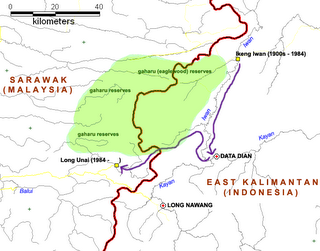Jungle Cosmopolitanism
 Tivai Ngang, Punan Busang headman of Long Unai
Tivai Ngang, Punan Busang headman of Long UnaiRetro Fieldnotes from Long Unai, Sarawak, January 2003
Tivai Ngang, a man in his mid-fifties, doesn't need a passport to enjoy the fruits of global border crossings. The headman of a Punan Busang tribe in Sarawak that has moved over from Indonesia 22 years ago, bordercrossing and transnational associations are as close to his heart as hunting wild boar or shooting monkeys with his blowpipe. An unlikely comparison at first sight, but he may have lots in common with your average Southeast Asian expat that has emigrated to settle and work abroad to Singapore, New Zealand or the US...well maybe more
Southeast Asian expats abroad are usually permitted to hold one job. Tivai instead multitasks to sustain his livelihood. Besides rice farming, he still adheres to his previous semi-nomadic hunting-gathering activities to support his family's subsistence,: he still hunts, collects sago starch, taps resins and harvests eaglewood ('gaharu') deep down in Borneo's inhabited rainforests.
While your average Southeast Asian expat has to compensate stress at work with physical workouts at fitness clubs/wellness centers and spas, Tivai doesn't need to.
Southeast Asian expats might be involved in transnational deals and fund flows, and may own properties both in Southeast Asia and abroad. Tivai has transnational access to forests, rivers, and may decide to sell whatever he extracts - depending on favourable market prices - to any country of his liking. (Indonesia/Malaysia/Brunei)
While your average Southeast Asian expat would rarely speak more than 2 languages, Tivai is multilingual and speaks 8 (Punan, Kenyah, Kayan, Iban, Bazaar Malay, Bahasa Indonesia proper, a bit of Banjarese and Foochow Chinese), out of neccesity for having to deal with Indonesian/Malaysian government officials, neighbouring ethnic groups, Foochow traders or Banjarese middlemen.
Southeast Asian expats would usually emigrate in single unit families. Tivai emigrated his entire village in 1984 from Indonesia to Malaysia...
========================
The story of Long Unai
The story of Tivai's village moving to Sarawak is only one example out of numerous village migrations that have occurred during the last century in Borneo. Up to 1984, the Punan Busang hamlet was located on the upper reaches of the Iwan river at Long Ikeng Iwan, one of the most isolated settlements in East Kalimantan at that time. The Indonesian Government in 1984, out of embarrassment that nomadic hunter-gathering communities 'tribes' still existed side by side our national aircraft industry, set out to 'civilize' these 'savages'. In doing so, the government initiated semi-forced resettlement programmes, and most Punan hamlets were ordered to join the more 'civilized' Kenyah and Kayan settlements downriver.
 The Upper Balui
The Upper BaluiThe Busang Punans of Long Ikeng Iwan received a governmental order in 1984 to resettle at Data Dian, a Kayan village which also seats the Kecamatan (Sub-District) center. This posed some problems for the Punans. First, they weren't prepared to abandon their semi-nomadic lifestyles with a sedentary farming culture as the government insisted them to do so. Secondly, this forced resettlement only separated the Punans further away from the gaharu-rich forests which provided them much of their basic needs. Always disregarding the border's existence, this also included the large tracts of adjacent rainforests in Sarawak, where gaharu reserves were abundant.
 Punan Busang Migration map from Long Ikeng Iwan (Indonesia) to Long Unai (Malaysia)
Punan Busang Migration map from Long Ikeng Iwan (Indonesia) to Long Unai (Malaysia)Tivai, being the young headman of the Long Ikeng Iwan hamlet at the time, decided that resettlement was something too much to risk for. Fearing intimidation by Sub-District officials and police, he silently led his fellow villagers on foot one early morning into Sarawak. They decided for a suitable place at Long Unai, on the Upper Balui river, still in close proximity to the rainforests on both sides the border they had roamed for years.
Long Unai was classified by the Sarawak government as an illegal settlement until it gained official recognition in 2001. Despite having pledged allegiance to the Malaysian Yang Dipertuan Agong, Tivai and his followers still sell gaharu to Long Nawang on the Indonesian side, where Banjarese middlemen still offer better prices compared to their Chinese competitors on the Sarawak side. But Tivai never looks at his newly acquired Malaysian citizenship as permanent. "If the Indon government provides us free healthcare and education like they do in Sarawak, we might move back to Indon someday. The forests there are richer, and the waters still more abundant with fish."
A good lesson about what 'citizenship' really means...

4 Comments:
another good topic to be written with alot of real experience in it, reading your piece just like going back to the class, when the Prof. actually talking about Borneo and Punan...
Bring back memories and I wish I could go back to school
*sigh
anyhoo, nice piece, OoM! :P
Indonesia the "Imagined Community", and the People seeking their end of the "Social Contract". Awesome writeup.
Salam Oom/Bung/Mas/Kak/[plain] Dave!
Browsing through your photo collections of Borneo is like going back in time.
As a Punan myself - I'm kinda curious how the "Punan Busang" got their name. So is the Aehong, penyawung etc., I've read some of the literatures written about Punan in Kalimantan. But have yet to see them myself. I've visited places like Sanggau and Balikpapan.
i'm about to start my phd anthropology research on the punan/penan of borneo. any information on getting to punan settlements in thr rainforest will be greatly thankful. i'm very interested to start with east kalimantan balikpapan, samarinda etc. any hints will be welcome. thanks alot. haya (tel-aviv israel)
Post a Comment
<< Home